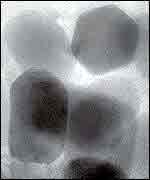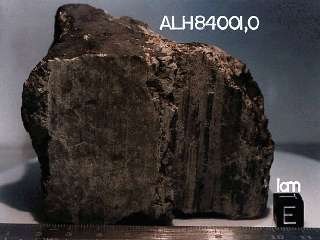Tiny dots of life, smaller than a pinhead, thriving deep in the thick of the soil in the humid regions where the weather is milder than in other regions of Mars
Tiny points of life, smaller than the head of a pin, thriving deep in the soil in the humid regions where the weather is milder than in other regions of Mars more...

A highly enlarged photograph of the suspicious spots discovered inside the rock from Mars. Later, many scientists claimed that it is not certain that these are actually bacteria
They don't have antennae, small, pointed heads or death rays of the kind that "Gesells" described in his "War of the Worlds". Nevertheless, it is quite possible that they exist and live comfortably in isolated and closed parts of the red planet - that is Mars. So, at least, scientists are beginning to think.
These hidden inhabitants of Mars are apparently not large, complex organisms, but tiny dots of life, smaller than pinheads, thriving deep in the thick of the soil in the humid regions where the weather is milder than elsewhere on Mars.
Such a kingdom of bacteria (microbes) would have managed to escape the detection of the robotic probes that landed on Mars in 1976 and found no signs of life on the dry surface of the hot planet. If inhabitants of the depths of Mars do exist, they will be difficult to find; And if they are found, they will certainly disappoint some of humanity, because they may resemble more the moss and dirt around the shower than the exotic creatures described in science fiction books.
One of the areas of interest in finding life on another planet is the light it may shed on the question of how life began on Earth. Especially if life on Mars did begin, as some scientists believe, at an earlier stage than ours. A discovery on Mars will also help calculate the chances of life forming elsewhere in the universe.
The renewed hunt for life on Mars, mainly in the form of bacteria, should begin later this year. The driving force is based on recently discovered findings - according to which in an early period the planet was hotter and more humid than previously thought - and the knowledge that bacteria thrive in such environments.
Since the probes landed on Mars, 20 years ago, it became clear that on Earth the bacteria thrive in places like volcanoes at the bottom of the sea - extremely hot, dark, deep and deadly areas for all other life forms. Furthermore, genetic studies have shown that bacteria living in such extreme environments are closely related to the first forms of life on Earth, and from this it is suggested that evolution may have begun in greenhouse conditions, similar to those that prevailed, perhaps, on Mars four billion years ago.
"We live today in a different world than 20 years ago," explains Michael Carr, a scientist with the American Geological Survey, who headed the teams that analyzed the findings of the Mars probe in 76. can start on Mars has grown considerably."
Similar things are uttered by Jack D. Fermer, a Mars expert at the American space agency, NASA. "We know today that liquid water was abundant on Mars in the beginning, and maybe it is still under the surface of the ground," he says. "Therefore, one should ask why no life will be found there. The chances of that, in my opinion, are fifty-fifty."
Towards the end of the year, probably in December, two rockets carrying research equipment are supposed to go to Mars and thereby open a series of international studies. In the next decade, the United States, Europe, Russia and Japan hope to launch up to 20 missions to Mars. The main goal - finding water and life.
One of the probes, Mars Pathfinder is supposed to go straight to Mars and land in an ancient valley where there was once a flood. It is supposed to launch photographs from the ground, monitor the weather and operate a small vehicle to inspect the surrounding area and take samples of soil and rocks. The second probe, @ Mars Surveyor will go into orbit around Mars, and will examine the ground for an entire Martian year in order to find signs of water. But in the end, the scientists believe that finding life in the form of bacteria on Mars may require drilling into the shell - a difficult task that will probably require the presence of humans. The scientists say that even the discovery of fossilized bacteria, or biochemical precursors of life, would be an extraordinary find. On the surface of the earth, the wind, the rain, the drift and geological upheavals that took place over billions of years erased most of the clues and signs of the primordial life forms.
In contrast, on Mars "a large part of the surface is ancient and may contain evidence of what happened in its earliest history", as Michael Meyer, who heads NASA's program to find life on other planets, says. "Inspection and search may open a window to the first billion years of our solar system and the origin of life on Earth, as well as on Mars."
In 1976, two Viking spacecraft photographed Mars and landed on it. Although the cameras orbiting the star found many evidences that at one time water flowed on the surface of the star - the samples collected from the Martian soil did not show clear signs of life. But since then, a quiet upheaval on Earth began to shake the foundations of biology, when scientists discovered bacteria in areas where the temperature reached up to 112 degrees Celsius. They have been discovered in hot springs, volcanic vents on the sea floor, hot and deep oil reservoirs and rocks located many kilometers below the earth's surface.

In the picture - the meteorite from Mars suspected of carrying life
Carl Vazza from the University of Illinois stunned the scientific world when he announced that some of the heat-loving bacteria constitute a third superfamily of life, different from those of bacteria, plants and animals. The third group known as Archaea ranks as the earliest known life forms on Earth.
In 1992, Thomas Gold of Cornell University proposed that bacteria may be common in the upper kilometers of the Earth's crust, where they live in fluid-filled pores, cracks and holes in rocks and feed on the Earth's internal heat and chemicals. "It is possible that such life is very common in the universe," wrote Gould, "since planet-like bodies, with similar conditions below the surface, may be common as single objects in space or in other systems similar to the solar system."
Norman Sleep from Stanford University recently proposed that Mars was originally more habitable than Earth. Some scientists hypothesize that a collision that happened billions of years ago between Mars and a planet ripped off some bacteria-bearing rocks from the planet, and they fell to Earth. This fall could have sown the seeds of life on Earth and made man a descendant of ancient beings from Mars.

10 תגובות
Indeed, I believe there is life on the planet Mars. Water was even discovered on it. And besides, I think whoever says that we are the only ones living in this universe, is a complete egoist.
Anyone who says this probably knows nothing about astronomy. He just thinks that aliens are imaginary and so stupid, but hey. You will be surprised. Our moon also has water...Mars also has life...and maybe somewhere in general, in another galaxy, in another solar system, there is a sun like our sun and around it a circle of stars, and the third of them is another earth. It's not that weak. So if you think you know everything, you will be surprised.
Guys, we're not the only ones here.
Not an up-to-date article at all. But instead of trampling the research done here? (if at all) I will shower you with the knowledge I have accumulated about this amazing planet. I would like to say that life on Mars was discovered exactly 3.56 years ago. Creatures were found called microprotels, as their name suggests they are very tiny. But the irony here is actually that the discovery itself is not micro at all but clearly macro. This is indeed a breakthrough discovery. I am personally a big fan of theories about Mars or rather established facts. I have been researching Mars for a long time and have been planning my trip to detail for something like 9 years. I'll be honest and say that this whole preoccupation with Mars has taken over my agenda and life in general. Just a taste of this, is that my wife broke up with me last March (funny that it happened this way from March to March) after she claimed that she was unable to deal with my "craziness", after she left the house slamming the door, I wasn't excited at all and even shouted at her because I was planning to take her on a trip to Mars to the moon Our honey, by the way, has never been. With this I would like to end my sentence.
Indeed this life from Mars is already 20 years old.
Maybe they already have their own children?
You both noticed that this article is almost 20 years old, right?
Jacob
What is wrong with the article?
Is your site about accurate science fiction?